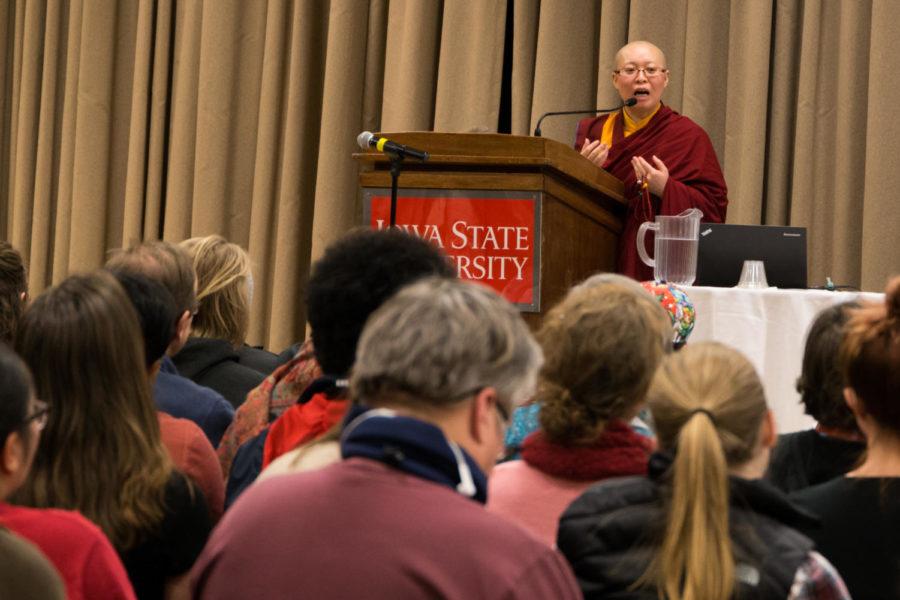Buddhist Nun shares secrets to happiness
Mikinna Kerns/Iowa State Daily
Tibetan Buddhist nun Ven. Yuan Hao speaks in Memorial Union Sun Room Jan. 23. Her lecture focused on how to find happiness in our hectic world.
January 23, 2018
Delusions. Distractions. These are the things that trap us in depression and frustration.
This is what Buddhist Nun Dr. Yuan Hao told more than 200 people at 7 p.m. on Jan. 23 at the Memorial Union. Community members, students and faculty alike filled the Sun Room to hear Hao’s philosophies about mental states.
With a Ph.D. in chemical engineering, Hao studied Buddhism at Larung Gar Five Sciences Academy. She is now an ordained nun and even offers online courses in Buddhism.
“It was really inspiring to see who it was coming from,” said Cody McKune, junior in forestry. “The overall perception of scientists is that they aren’t concerned with philosophies… but she really breaks that mold.”
Hao spoke about the veneer of happiness our modern society can create. She said technology can be useful, but if we don’t understand how our mind works, it can drive us to depression.
“Nowadays, in this world, we’re so busy and overloaded with information in this fast paced life,” Hao said. “We are distracted. We are disturbed by so many different things.”
Hao used social media as an example.
“We’re very social, but these distractions make us so very exhausted,” Hao explained. “We feel so very connected, but yet this feeling of loneliness gets stronger.”
Hao believes one must understand how their mind works, what sorts of conditions make them feel happy or depressed, to understand true happiness. She offered several analogies to make her point.
“I know if I eat certain foods it will make me sick,” Hao said, comparing it to “traps” we can fall into that make us sad. “I avoid these foods, and I eat the foods which make me healthy.”
The problem is the conditions that trap us are harder to visualize than poisonous food. Hao said we must understand our mind’s reactions as we understand how to navigate highways, and learn to avoid the obstacles which obscure our path and disrupt happiness.
“We don’t have the freedom or ability to choose when we’re happy, when we’re mad,” Hao pointed out, “Instead, we are all controlled by external conditions.”
Hao’s philosophy starts with educating yourself about how your mind reacts to certain conditions. The next step is learning how to avoid certain conditions which yield negative results and understanding different perspectives.
Delusions keep us from comprehending certain perspectives. Hao claimed we all live with many delusions every day. Some we are ignorant of, but some we understand and choose to ignore. In psychology this is called cognitive dissonance.
“We don’t ask to the real nature of reality,” Hao said. “We live in a beautiful world we created for ourself out of delusion. Ultimately, it is just very sad.”
Hao believes people create these delusions to cope with life. Things like uncertainty and a fear of death can make people greatly uncomfortable, so they establish falsehoods to make reality more bearable.
“Delusion is with us every day, and if we’re satisfied with these delusions we cannot find true happiness,” Hao said.
She recommended meditation as a way for people to reflect and realize the delusions in their life which are holding them back.
Hao advised the audience to balance belief and doubt, be open minded enough to accept evidence, make your own conclusions and analyze those conclusions. This will help you avoid distractions and delusions, and find happiness.







